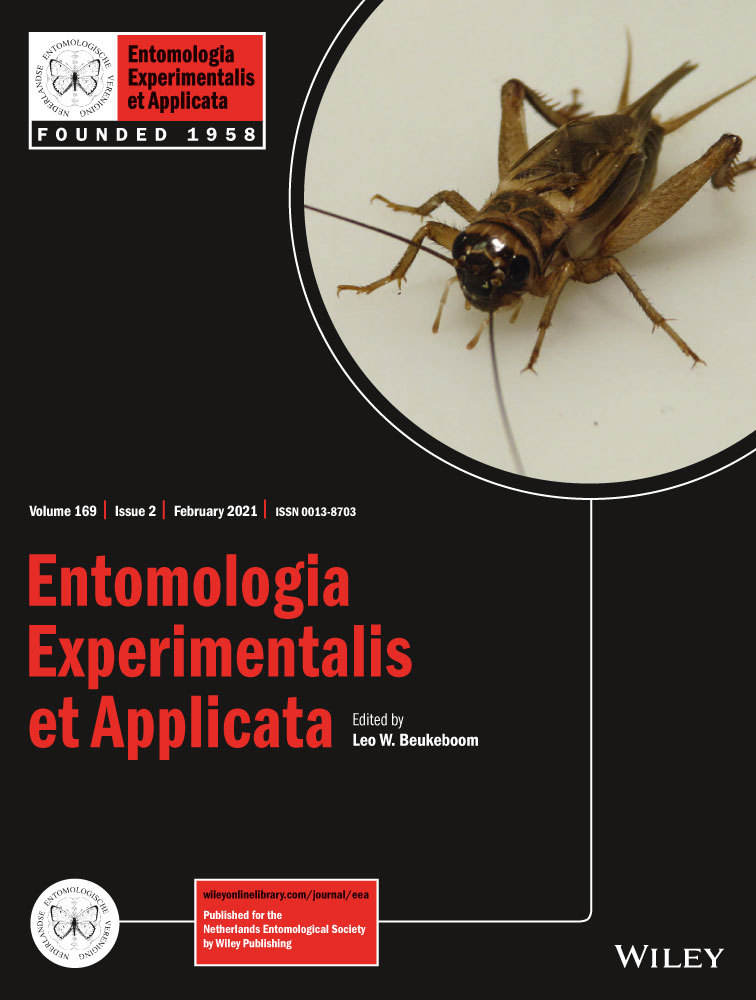Ver ítem
- xmlui.general.dspace_homeCentros e Institutos de InvestigaciónCICVyA. Centro de Investigación en Ciencias Veterinarias y AgronómicasInstituto de GenéticaArtículos científicosxmlui.ArtifactBrowser.ItemViewer.trail
- Inicio
- Centros e Institutos de Investigación
- CICVyA. Centro de Investigación en Ciencias Veterinarias y Agronómicas
- Instituto de Genética
- Artículos científicos
- Ver ítem
Lemon and Schinus polygama essential oils enhance male mating success of Anastrepha fraterculus
Resumen
The sterile insect technique (SIT) is an environmentally friendly pest control method that relies on the introduction of sterility into the pest population by the release of sterile males. Many Tephritidae fruit fly pests are currently being controlled with SIT. Sterile insect technique efficacy can be increased if the sexual success of mass-reared sterile males is enhanced. Phytochemicals influence the sexual behaviour of many species of phytophagous
[ver mas...]
The sterile insect technique (SIT) is an environmentally friendly pest control method that relies on the introduction of sterility into the pest population by the release of sterile males. Many Tephritidae fruit fly pests are currently being controlled with SIT. Sterile insect technique efficacy can be increased if the sexual success of mass-reared sterile males is enhanced. Phytochemicals influence the sexual behaviour of many species of phytophagous insects. Here, we evaluated the possibility of using essential oils to enhance male sexual success of the highly polyphagous fruit fly pest Anastrepha fraterculus (Wiedemann) (Diptera: Tephritidae), also known as the South American fruit fly. In laboratory tests, we determined the effect of exposing males to volatiles from seven essential oils [Baccharis spartioides (Hook. & Arn) Cabrera (Asteraceae), Schinus polygama (Cav.) Cabrera, Schinus areira (L.) (Anacardiaceae), Zingiber officinale (Roscoe) (Zingiberaceae), Citrus limon (L.) Burm. F., Citrus paradisi Macfad., and Citrus sinensis (L.) Osbeck (Rutaceae)] and two monoterpenes (limonene and citral) that are present at high proportions in some of the oils we evaluated. One exposed and one non-exposed (control) male were placed in a mating arena with one virgin female. We recorded the type of male chosen as mating partner, copula start time, and copula duration. Laboratory males exposed to the volatiles of C. limon and S. polygama essential oils achieved more matings than non-exposed males. The rest of the oils had no effect on male mating success. In addition, limonene-exposed males obtained significantly more matings than non-exposed males, and citral induced a detrimental
effect. Exposure to the volatiles of the various essential oils and monoterpenes did not impact on copula start time and copula duration. We discuss the role of essential-oil volatiles on A. fraterculus males’ sexual behaviour and its implications for SIT
[Cerrar]

Autor
Ruiz, María Josefina;
Suárez, María L.;
Jofré Barud, Flavia;
Goane, Lucía;
Valladares, Gabriela A.;
Bachmann, Guillermo Enrique;
Belliard, Silvina Ahnahi;
Páez Jerez, Paula;
Zamora Belli, Ana Lucía;
García Méndez, F. Daniela;
Segura, Diego Fernando;
Lopez, María Liza;
Vera, María Teresa;
Fuente
Entomologia experimentalis et applicata 169 (2) : 172-182 (November 2020)
Fecha
2020-11-27
Editorial
Wiley
ISSN
1570-7458
Formato
pdf
Tipo de documento
artículo
Palabras Claves
Derechos de acceso
Embargado
 Excepto donde se diga explicitamente, este item se publica bajo la siguiente descripción: Creative Commons Attribution-NonCommercial-ShareAlike 2.5 Unported (CC BY-NC-SA 2.5)
Excepto donde se diga explicitamente, este item se publica bajo la siguiente descripción: Creative Commons Attribution-NonCommercial-ShareAlike 2.5 Unported (CC BY-NC-SA 2.5)

